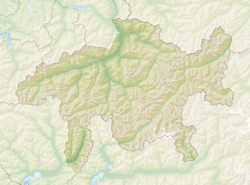St. Peter, Switzerland facts for kids
Quick facts for kids
St. Peter
|
||
|---|---|---|
|
||
| Country | Switzerland | |
| Canton | Graubünden | |
| District | Plessur | |
| Area | ||
| • Total | 6.88 km2 (2.66 sq mi) | |
| Elevation | 688 m (2,257 ft) | |
| Population | ||
| • Total | 168 | |
| • Density | 24.42/km2 (63.24/sq mi) | |
| Postal code |
7028
|
|
St. Peter (Romansh: Son Peder) is a small village in Switzerland. It is located in the beautiful canton of Graubünden. For a long time, St. Peter was its own independent municipality. But on January 1, 2008, it joined with a nearby village called Pagig. Together, they formed a new, larger municipality known as St. Peter-Pagig.
Contents
History of St. Peter
Early Beginnings
St. Peter has a very long history! The village was first mentioned in records during the late Middle Ages. This period was roughly from the 1300s to the 1500s. The village church is even older. It was first written about in the year 831. That means the church is over 1,000 years old! The church and a part of the village called Laeschgas used to belong to a special place called Pfäfers Abbey.
Geography of the Village
Where St. Peter Is Located
St. Peter is in a region called Schanfigg. It sits on a northern slope, high up at about 1,160 meters (3,806 feet) above sea level. The village itself has two main parts. In 2008, St. Peter joined with the village of Pagig to create the new municipality of St. Peter-Pagig.
Land Use and Area
As of 2006, St. Peter covers an area of about 6.9 square kilometers (2.7 square miles). A large part of this land, about 61%, is used for farming. Forests cover another 30.1% of the area. About 4.2% of the land has buildings or roads on it. The remaining 4.7% is made up of things like rivers or mountains that are not used for farming or building.
Getting Around: The Railway Station
There is a train station nearby called Sankt Peter-Molinis. This station is on the Chur-Arosa railway line. It also serves the nearby village of Molinis.
People and Population
Who Lives in St. Peter
As of 2007, St. Peter had a population of 168 people. About 15.5% of these people were from other countries. Over the ten years before 2007, the number of people living in St. Peter grew by about 8.4%.
Languages Spoken
Most people in St. Peter speak German. As of 2000, about 95.5% of the population spoke German. The second most common language was Albanian, spoken by about 2.6% of the people. French was the third most common, spoken by about 0.6%.
Age and Gender
In 2000, about 54.2% of the people in St. Peter were male, and 45.8% were female. Let's look at the age groups as of 2004:
- Young children (0-9 years old): 7 children, or 4.5% of the population.
- Teenagers (10-19 years old): 16 teenagers, or 10.4%.
- Young adults (20-29 years old): 13 people, or 8.4%.
- Adults (30-39 years old): 15 people, or 9.7%.
- Middle-aged adults (40-49 years old): 25 people, or 16.2%.
- Older adults (50-59 years old): 26 people, or 16.9%.
- Seniors (60-69 years old): 27 people, or 17.5%.
- Elderly (70-79 years old): 19 people, or 12.3%.
- Very elderly (80-89 years old): 4 people, or 2.6%.
- Oldest residents (90-99 years old): 2 people, or 1.3%.
Education and Work
Most people in Switzerland are well educated. In St. Peter, about 67% of adults (aged 25-64) have completed either high school or even higher education, like university.
St. Peter has a very low unemployment rate, which means almost everyone who wants a job has one. The rate was only 0.43%. As of 2005, here's how people worked:
- Primary Sector: 6 people worked in this sector, which includes things like farming and forestry. There were 2 businesses in this area.
- Secondary Sector: 14 people worked in this sector, which includes manufacturing and building things. There were 3 businesses here.
- Tertiary Sector: 18 people worked in this sector, which includes services like shops, hotels, and offices. There were 9 businesses in this area.
Historical Population Numbers
Here's how the population of St. Peter has changed over many years:
| year | population |
|---|---|
| 1808 | 197 |
| 1850 | 108 |
| 1900 | 115 |
| 1950 | 161 |
| 2000 | 154 |
Images for kids
See also
 In Spanish: Sankt Peter para niños
In Spanish: Sankt Peter para niños
 | Aaron Henry |
 | T. R. M. Howard |
 | Jesse Jackson |






